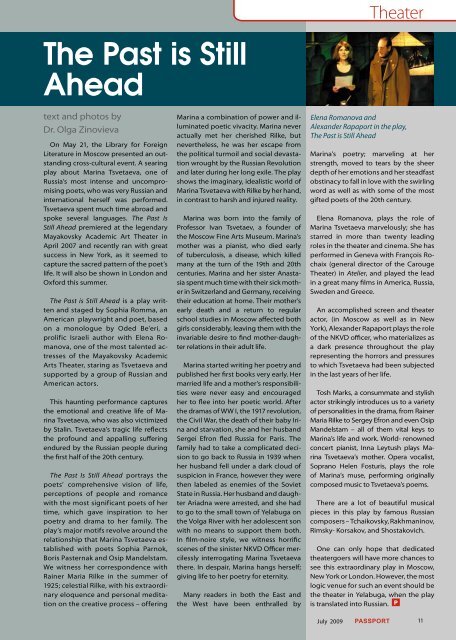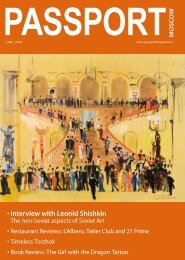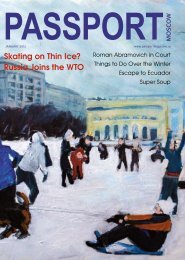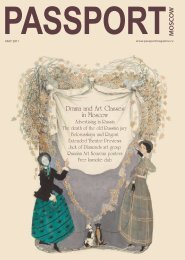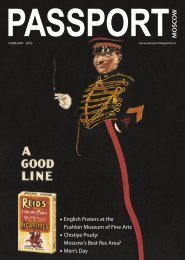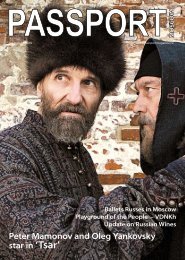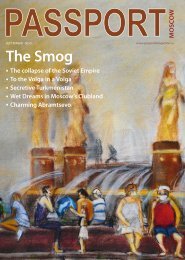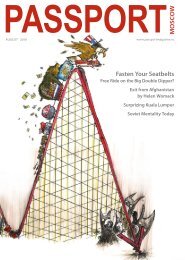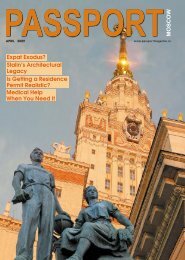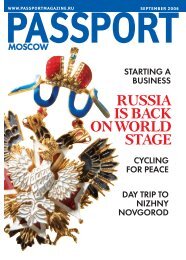Part one of Passport's guide to Moscow's favorite - Passport magazine
Part one of Passport's guide to Moscow's favorite - Passport magazine
Part one of Passport's guide to Moscow's favorite - Passport magazine
Create successful ePaper yourself
Turn your PDF publications into a flip-book with our unique Google optimized e-Paper software.
The Past is Still<br />
Ahead<br />
text and pho<strong>to</strong>s by<br />
Dr. Olga Zinovieva<br />
On May 21, the Library for Foreign<br />
Literature in Moscow presented an outstanding<br />
cross-cultural event. A searing<br />
play about Marina Tsvetaeva, <strong>one</strong> <strong>of</strong><br />
Russia’s most intense and uncompromising<br />
poets, who was very Russian and<br />
international herself was performed.<br />
Tsvetaeva spent much time abroad and<br />
spoke several languages. The Past Is<br />
Still Ahead premiered at the legendary<br />
Mayakovsky Academic Art Theater in<br />
April 2007 and recently ran with great<br />
success in New York, as it seemed <strong>to</strong><br />
capture the sacred pattern <strong>of</strong> the poet’s<br />
life. It will also be shown in London and<br />
Oxford this summer.<br />
The Past is Still Ahead is a play written<br />
and staged by Sophia Romma, an<br />
American playwright and poet, based<br />
on a monologue by Oded Be’eri, a<br />
prolific Israeli author with Elena Romanova,<br />
<strong>one</strong> <strong>of</strong> the most talented actresses<br />
<strong>of</strong> the Mayakovsky Academic<br />
Arts Theater, staring as Tsvetaeva and<br />
supported by a group <strong>of</strong> Russian and<br />
American ac<strong>to</strong>rs.<br />
This haunting performance captures<br />
the emotional and creative life <strong>of</strong> Marina<br />
Tsvetaeva, who was also victimized<br />
by Stalin. Tsvetaeva’s tragic life reflects<br />
the pr<strong>of</strong>ound and appalling suffering<br />
endured by the Russian people during<br />
the first half <strong>of</strong> the 20th century.<br />
The Past Is Still Ahead portrays the<br />
poets’ comprehensive vision <strong>of</strong> life,<br />
perceptions <strong>of</strong> people and romance<br />
with the most significant poets <strong>of</strong> her<br />
time, which gave inspiration <strong>to</strong> her<br />
poetry and drama <strong>to</strong> her family. The<br />
play’s major motifs revolve around the<br />
relationship that Marina Tsvetaeva established<br />
with poets Sophia Parnok,<br />
Boris Pasternak and Osip Mandelstam.<br />
We witness her correspondence with<br />
Rainer Maria Rilke in the summer <strong>of</strong><br />
1925; celestial Rilke, with his extraordinary<br />
eloquence and personal meditation<br />
on the creative process – <strong>of</strong>fering<br />
Marina a combination <strong>of</strong> power and illuminated<br />
poetic vivacity. Marina never<br />
actually met her cherished Rilke, but<br />
nevertheless, he was her escape from<br />
the political turmoil and social devastation<br />
wrought by the Russian Revolution<br />
and later during her long exile. The play<br />
shows the imaginary, idealistic world <strong>of</strong><br />
Marina Tsvetaeva with Rilke by her hand,<br />
in contrast <strong>to</strong> harsh and injured reality.<br />
Marina was born in<strong>to</strong> the family <strong>of</strong><br />
Pr<strong>of</strong>essor Ivan Tsvetaev, a founder <strong>of</strong><br />
the Moscow Fine Arts Museum. Marina’s<br />
mother was a pianist, who died early<br />
<strong>of</strong> tuberculosis, a disease, which killed<br />
many at the turn <strong>of</strong> the 19th and 20th<br />
centuries. Marina and her sister Anastasia<br />
spent much time with their sick mother<br />
in Switzerland and Germany, receiving<br />
their education at home. Their mother’s<br />
early death and a return <strong>to</strong> regular<br />
school studies in Moscow affected both<br />
girls considerably, leaving them with the<br />
invariable desire <strong>to</strong> find mother-daughter<br />
relations in their adult life.<br />
Marina started writing her poetry and<br />
published her first books very early. Her<br />
married life and a mother’s responsibilities<br />
were never easy and encouraged<br />
her <strong>to</strong> flee in<strong>to</strong> her poetic world. After<br />
the dramas <strong>of</strong> WW I, the 1917 revolution,<br />
the Civil War, the death <strong>of</strong> their baby Irina<br />
and starvation, she and her husband<br />
Sergei Efron fled Russia for Paris. The<br />
family had <strong>to</strong> take a complicated decision<br />
<strong>to</strong> go back <strong>to</strong> Russia in 1939 when<br />
her husband fell under a dark cloud <strong>of</strong><br />
suspicion in France, however they were<br />
then labeled as enemies <strong>of</strong> the Soviet<br />
State in Russia. Her husband and daughter<br />
Ariadna were arrested, and she had<br />
<strong>to</strong> go <strong>to</strong> the small <strong>to</strong>wn <strong>of</strong> Yelabuga on<br />
the Volga River with her adolescent son<br />
with no means <strong>to</strong> support them both.<br />
In film-noire style, we witness horrific<br />
scenes <strong>of</strong> the sinister NKVD Officer mercilessly<br />
interrogating Marina Tsvetaeva<br />
there. In despair, Marina hangs herself;<br />
giving life <strong>to</strong> her poetry for eternity.<br />
Many readers in both the East and<br />
the West have been enthralled by<br />
Elena Romanova and<br />
Alexander Rapaport in the play,<br />
The Past is Still Ahead<br />
Marina’s poetry; marveling at her<br />
strength, moved <strong>to</strong> tears by the sheer<br />
depth <strong>of</strong> her emotions and her steadfast<br />
obstinacy <strong>to</strong> fall in love with the swirling<br />
word as well as with some <strong>of</strong> the most<br />
gifted poets <strong>of</strong> the 20th century.<br />
Elena Romanova, plays the role <strong>of</strong><br />
Marina Tsvetaeva marvelously; she has<br />
starred in more than twenty leading<br />
roles in the theater and cinema. She has<br />
performed in Geneva with François Rochaix<br />
(general direc<strong>to</strong>r <strong>of</strong> the Carouge<br />
Theater) in Atelier, and played the lead<br />
in a great many films in America, Russia,<br />
Sweden and Greece.<br />
An accomplished screen and theater<br />
ac<strong>to</strong>r, (in Moscow as well as in New<br />
York), Alexander Rapaport plays the role<br />
<strong>of</strong> the NKVD <strong>of</strong>ficer, who materializes as<br />
a dark presence throughout the play<br />
representing the horrors and pressures<br />
<strong>to</strong> which Tsvetaeva had been subjected<br />
in the last years <strong>of</strong> her life.<br />
Tosh Marks, a consummate and stylish<br />
ac<strong>to</strong>r strikingly introduces us <strong>to</strong> a variety<br />
<strong>of</strong> personalities in the drama, from Rainer<br />
Maria Rilke <strong>to</strong> Sergey Efron and even Osip<br />
Mandelstam – all <strong>of</strong> them vital keys <strong>to</strong><br />
Marina’s life and work. World- renowned<br />
concert pianist, Inna Leytush plays Marina<br />
Tsvetaeva’s mother. Opera vocalist,<br />
Soprano Helen Fosturis, plays the role<br />
<strong>of</strong> Marina’s muse, performing originally<br />
composed music <strong>to</strong> Tsvetaeva’s poems.<br />
There are a lot <strong>of</strong> beautiful musical<br />
pieces in this play by famous Russian<br />
composers – Tchaikovsky, Rakhmaninov,<br />
Rimsky- Korsakov, and Shostakovich.<br />
One can only hope that dedicated<br />
theatergoers will have more chances <strong>to</strong><br />
see this extraordinary play in Moscow,<br />
New York or London. However, the most<br />
logic venue for such an event should be<br />
the theater in Yelabuga, when the play<br />
is translated in<strong>to</strong> Russian. P<br />
July 2009<br />
Theater<br />
11


